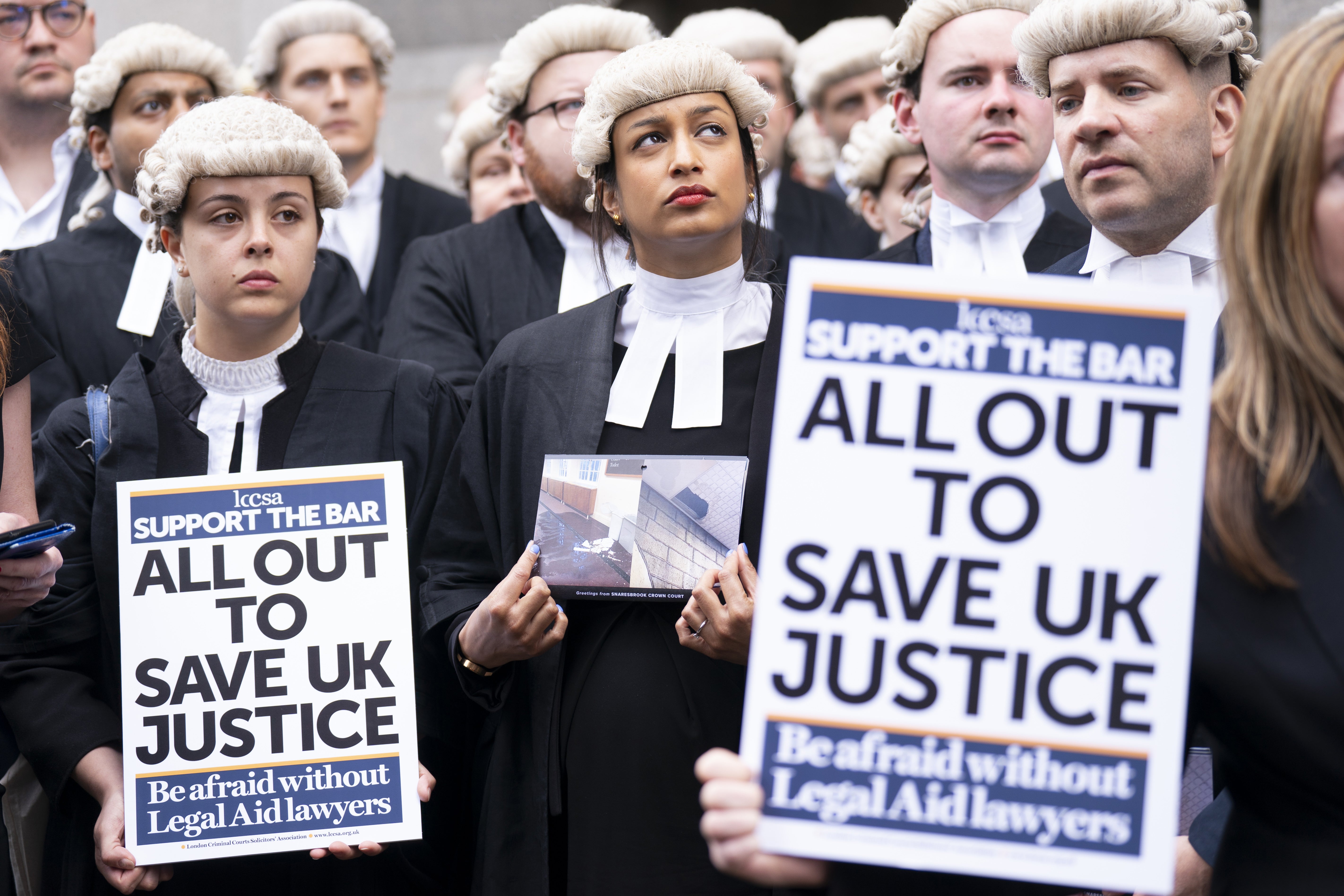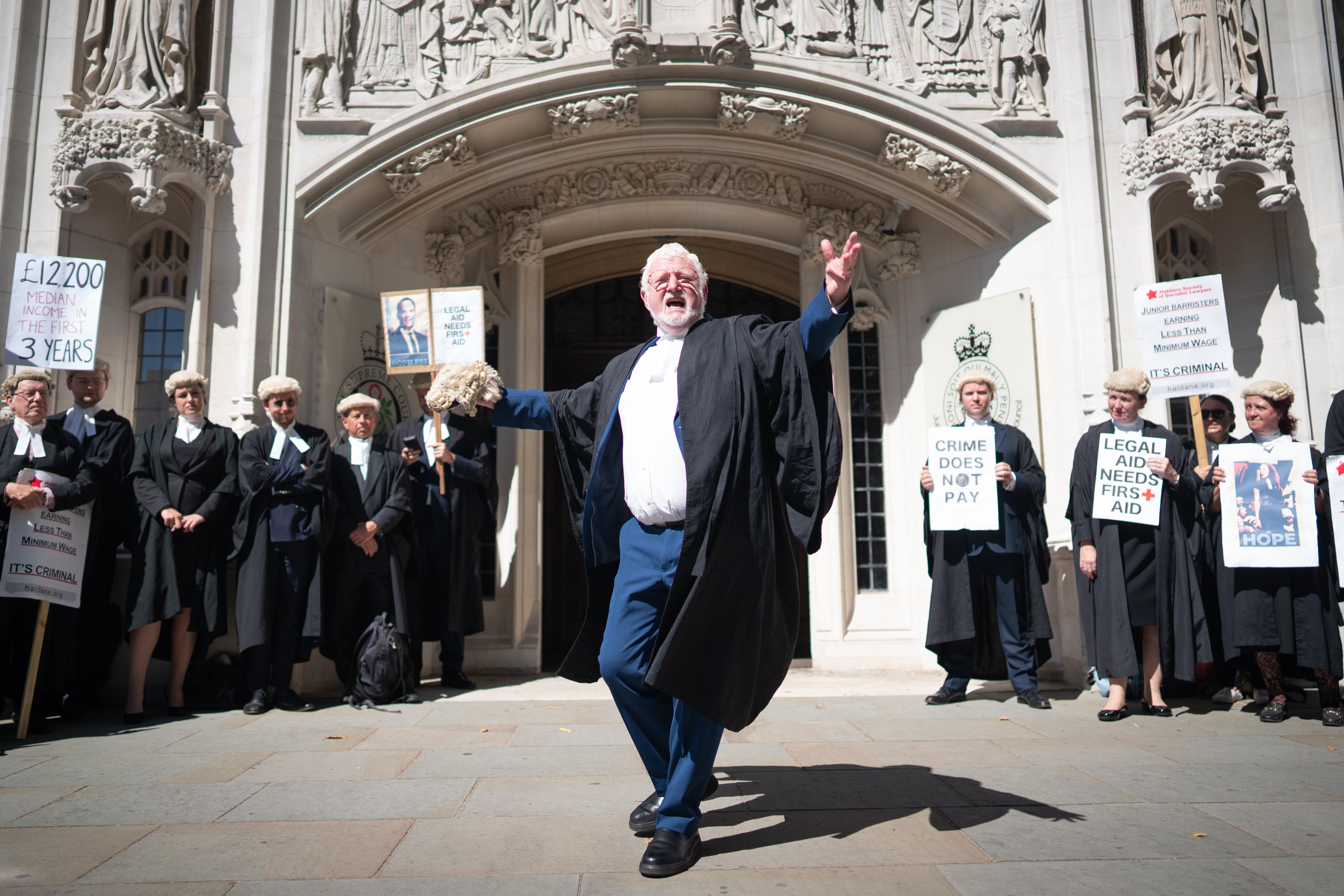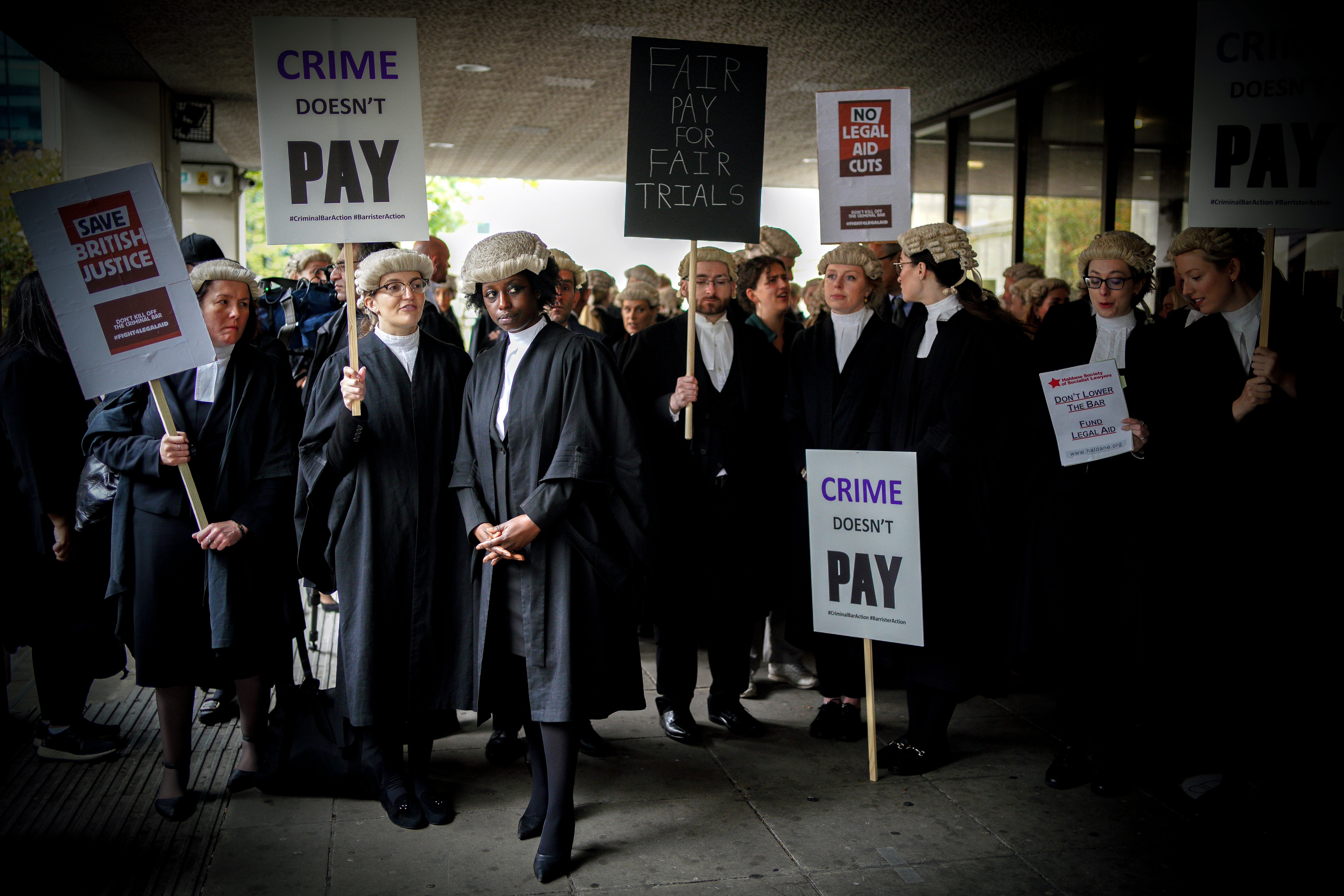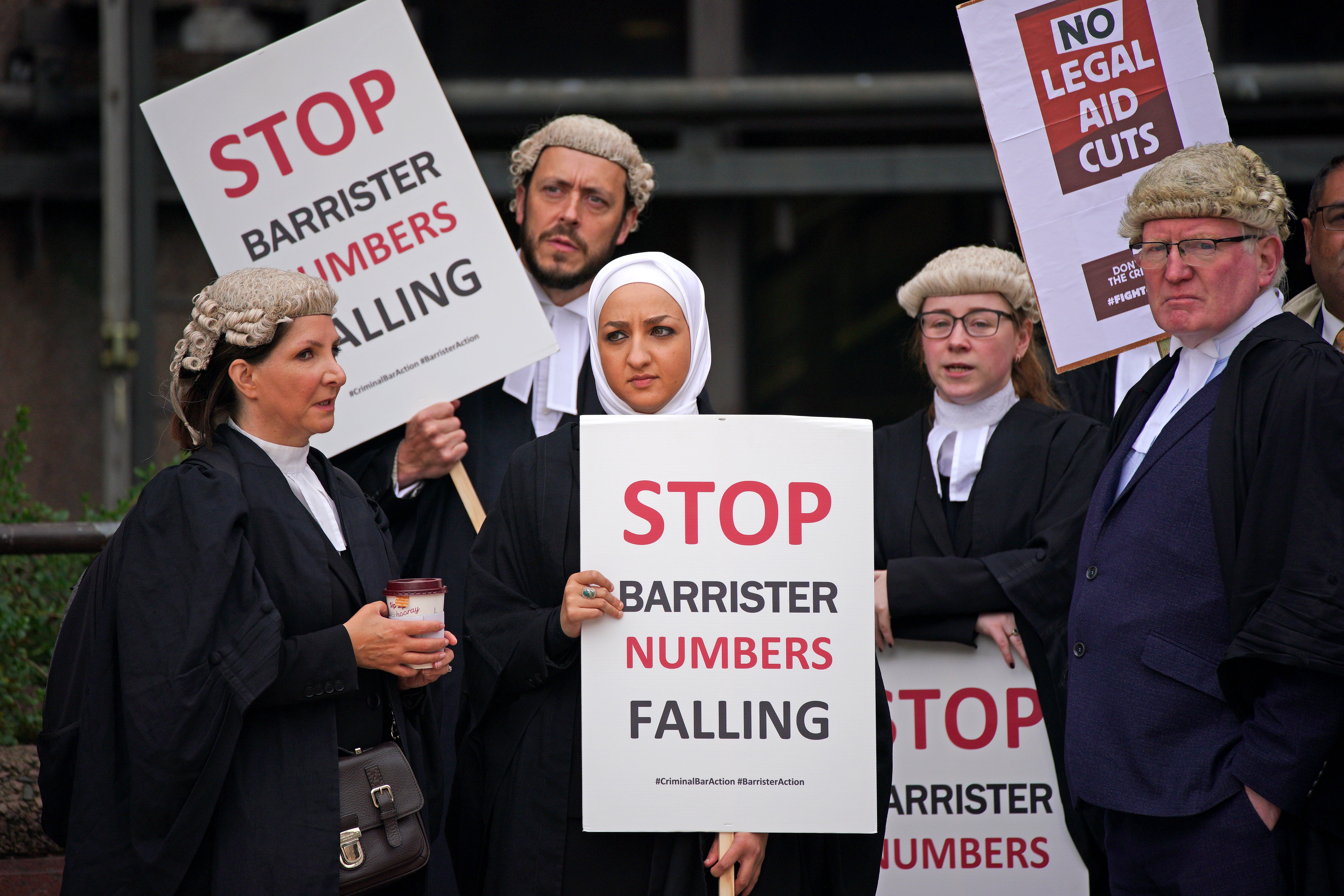Barristers strike: Why are criminal lawyers staging indefinite walkout?
All-out industrial action seeks to force government’s hand in long-running dispute
Your support helps us to tell the story
From reproductive rights to climate change to Big Tech, The Independent is on the ground when the story is developing. Whether it's investigating the financials of Elon Musk's pro-Trump PAC or producing our latest documentary, 'The A Word', which shines a light on the American women fighting for reproductive rights, we know how important it is to parse out the facts from the messaging.
At such a critical moment in US history, we need reporters on the ground. Your donation allows us to keep sending journalists to speak to both sides of the story.
The Independent is trusted by Americans across the entire political spectrum. And unlike many other quality news outlets, we choose not to lock Americans out of our reporting and analysis with paywalls. We believe quality journalism should be available to everyone, paid for by those who can afford it.
Your support makes all the difference.Criminal barristers in England and Wales have voted overwhelmingly in favour of an all-out strike that could bring Britain’s crown courts to a halt.
The vote will escalate an industrial dispute stretching back months has seen barristers walk out on alternate weeks and has already caused a significant growth in the enormous backlog of crown court cases.
The new action will bring an indefinite, uninterrupted strike from 5 September.
The escalation, combined with the ongoing arrangement, means the last working day for barristers will be on Friday, as they will walk out next week before the indefinite action begins.
Are you taking part in the barristers’ strike, or will it affect your case? Get in touch at Liam.James@independent.co.uk
Why are barristers striking?
Members of the Criminal Bar Association (CBA) are embroiled in a row over jobs and government-set fees for legal aid advocacy work – publicly funded representation for defendants who cannot afford to pay.
Chair Jo Sidhu QC previously said the action aimed to “shine a spotlight on the severity of the ongoing crisis in the criminal justice system”.

Barristers have complained that they effectively earn less than minimum wage, with on junior lawyer telling The Times she had earned more as a barista in a cafe.
The CBA says incomes have fallen nearly 30 per cent in 20 years, with specialist criminal barristers earning an average annual income after expenses of £12,200 in the first three years of practice.
The CBA also claimed the government had “manifestly failed to recognise the scale of the crisis and to act with the urgency required”.
Before the ballot closed on Sunday, Mr Sidhu said the all-out strike was a “last resort” taken with a “heavy heart”. He said it would be “a decision to which we have been driven after years and years of abject neglect”.
How has the strike affected the justice system so far?
According to MoJ figures, more than 6,000 court hearings have been disrupted a result of the dispute so far.
Data released under freedom of information laws show that during the first 19 days of industrial action – between 27 June and 5 August – there were 6,235 court cases disrupted, including 1,415 trials, across England and Wales.

Britain’s court system has a backlog of more than 58,000 cases. It has been a significant issue for years, though the numbers were declining before the Covid-19 pandemic caused a new surge.
What effect is escalating the strike going to have?
There are around 2,400 full-time criminal barristers in England and Wales. Of these, 1,808 CBA members – out of 2,273 who voted – were in favour of escalating the industrial action.
The action will see criminal justice system in crown courts grind to a halt. With legal representatives absent from proceedings, few will be able to go ahead. It may mean only the most severe and urgent cases can be prioritised.
Official figures suggest that for every full working week that criminal barristers strike, around 1,300 cases, including 300 trials, will be disrupted.

As a result of the action, defence barristers are also refusing to step in and pick up court hearings and other work for colleagues whose cases are overrunning – which typically helps to limit delays in the progress of proceedings.
Ultimately, it means victims could be waiting longer for justice and defendants could face delays in their case being concluded.
Has the government not offered barristers a pay rise already?
Yes. Criminal barristers are due to receive a 15 per cent rise in the fees they are paid for cases from the end of September, meaning they will earn £7,000 more per year, the Ministry of Justice (MoJ) said.
But there has been anger among lawyers that the proposed pay rise will not be made effective immediately and will only apply to new cases, not those already sitting in the backlog waiting to be dealt with by courts.

The MoJ previously said it had “repeatedly explained” to the CBA that backdating pay would require a “fundamental change” in how fees are paid, adding: “That reform would cost a disproportionate amount of taxpayers’ money and would take longer to implement, meaning barristers would have to wait longer for payment.”
What is the government’s position?
Ministers and officials have branded the decision “irresponsible” and warned the action will cause “unnecessary disruption” which will only see more victims face further delays and distress while they wait for their cases to be dealt with by courts.
In making the pay offer, the government agreed to match recommendations made by Sir Christopher Bellamy QC, who carried out a review of the legal aid system, by increasing investment in criminal legal aid by £135 million a year, including an increase in fees for criminal barristers.
But his report also warned the sum was the “minimum necessary as the first step in nursing the system of criminal legal aid back to health after years of neglect”, adding: “I do not see that sum as ‘an opening bid’ but rather what is needed, as soon as practicable, to enable ... the whole criminal justice system to function effectively, to respond to forecast increased demand, and to reduce the backlog.
“I by no means exclude that further sums may be necessary in the future to meet these public interest objectives. There is in my view no scope for further delay.”
Dominic Raab, the justice secretary, has not met the CBA and the government did not signal any change in its position following the announcement on Monday morning.




Join our commenting forum
Join thought-provoking conversations, follow other Independent readers and see their replies
Comments